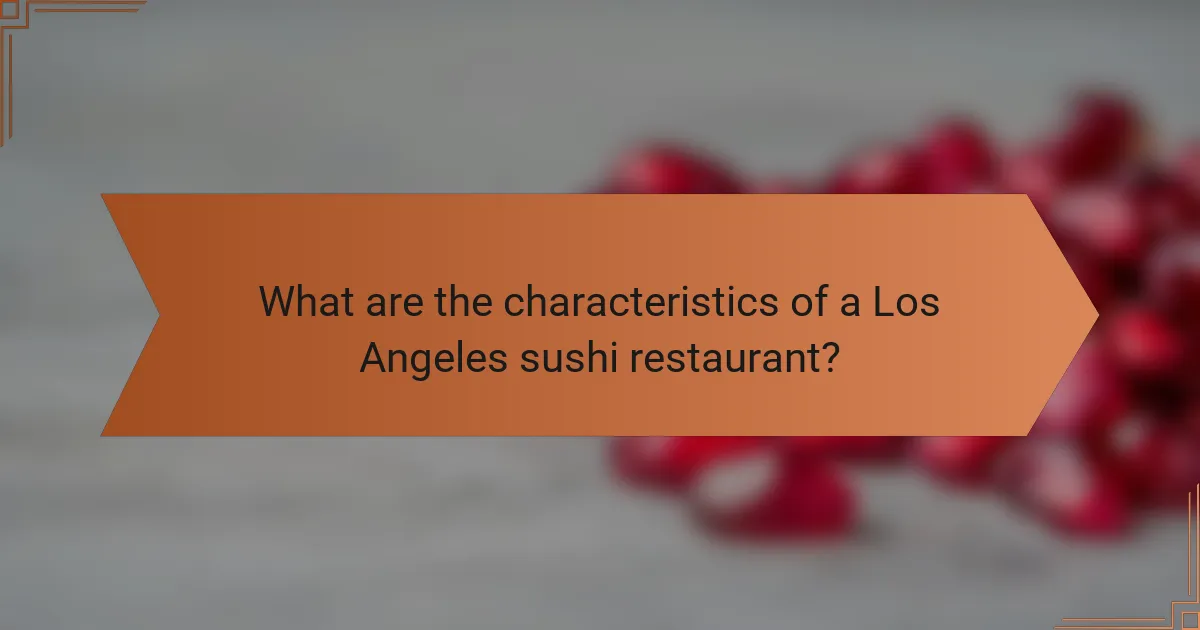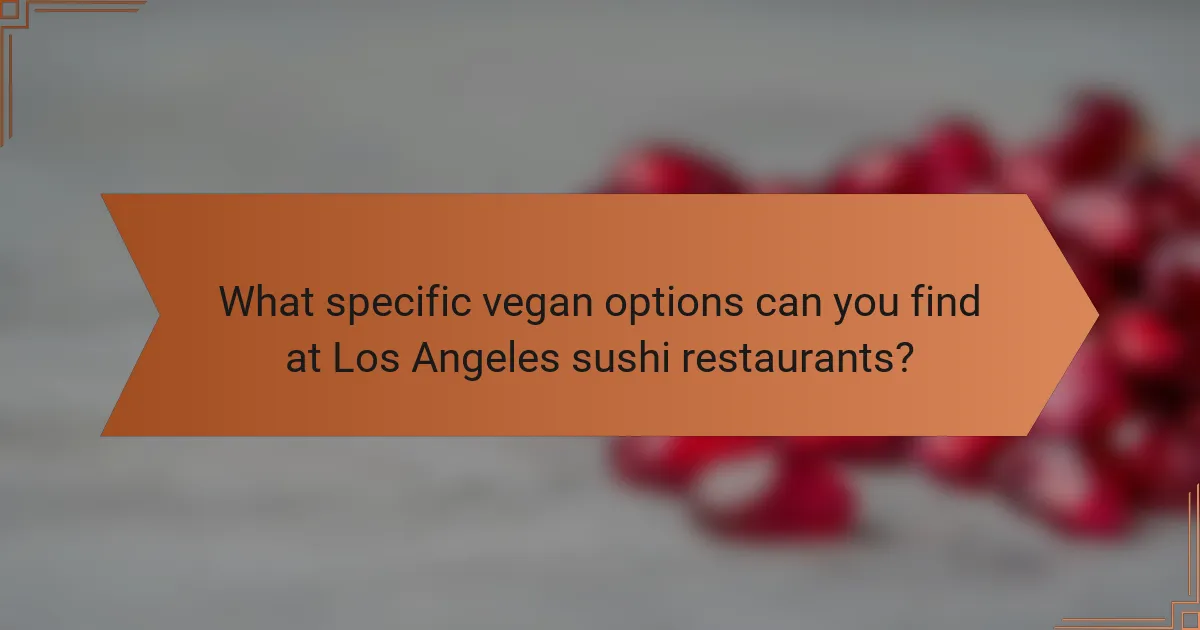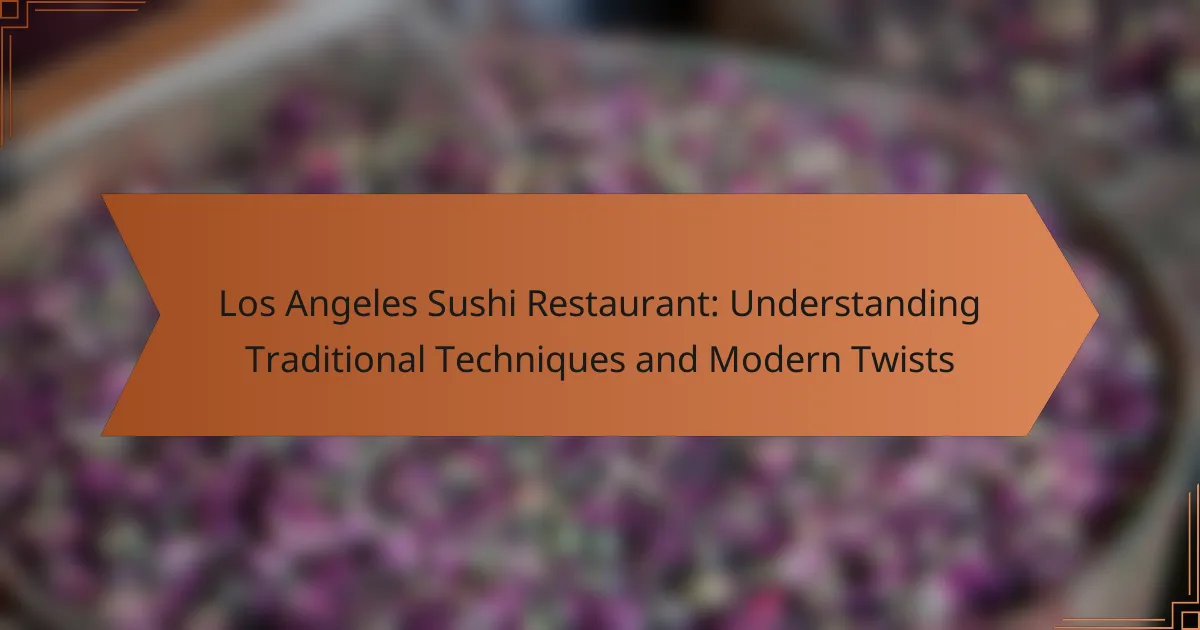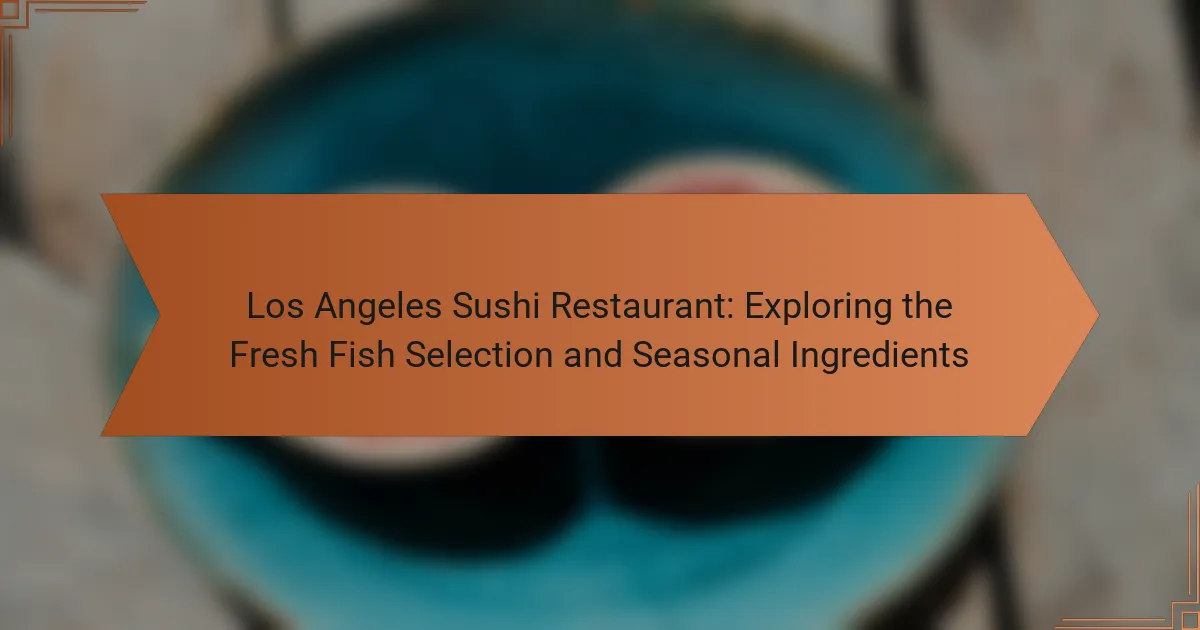Los Angeles sushi restaurants are known for their diverse menus that include both traditional and innovative sushi options, emphasizing fresh, high-quality ingredients sourced locally. Many establishments offer a variety of vegan and plant-based choices, such as avocado rolls, vegetable nigiri, and specialty rolls featuring ingredients like tempura vegetables. The incorporation of plant-based ingredients not only enhances the flavor and texture of sushi but also caters to dietary preferences and restrictions, making sushi accessible to a wider audience. Additionally, these restaurants often reflect the vibrant culture of Los Angeles through their ambiance and unique fusion styles, while also adhering to sustainable seafood practices. Overall, the dynamic dining experience in Los Angeles sushi restaurants highlights the growing demand for vegan cuisine within the sushi scene.

What are the characteristics of a Los Angeles sushi restaurant?
Los Angeles sushi restaurants typically feature a diverse menu that includes traditional and innovative sushi options. They often emphasize fresh, high-quality ingredients sourced from local markets. Many establishments cater to various dietary preferences, including vegan and plant-based options. The ambiance in these restaurants ranges from casual to upscale, reflecting the city’s vibrant culture. Additionally, many Los Angeles sushi restaurants incorporate unique fusion styles, blending different culinary influences. The use of sustainable seafood practices is also common, aligning with the city’s focus on environmental consciousness. Overall, these characteristics contribute to a dynamic dining experience in Los Angeles sushi restaurants.
How do vegan options fit into the sushi restaurant scene in Los Angeles?
Vegan options are increasingly integrated into the sushi restaurant scene in Los Angeles. Many sushi restaurants now offer plant-based sushi rolls. These rolls often feature ingredients like avocado, cucumber, and tofu. Some establishments create innovative dishes using vegan seafood alternatives. The demand for vegan options has risen significantly among health-conscious consumers. According to a survey by the Plant-Based Foods Association, plant-based food sales grew by 27% in 2020. This trend reflects a broader shift towards sustainable dining practices. As a result, sushi chefs are experimenting with creative vegan recipes. Los Angeles sushi restaurants are becoming more inclusive to cater to diverse dietary preferences.
What types of plant-based ingredients are commonly used in vegan sushi?
Common plant-based ingredients in vegan sushi include avocado, cucumber, and carrots. Other ingredients often used are bell peppers, radishes, and asparagus. Seaweed, particularly nori, serves as the outer layer. Sushi rice is typically seasoned with rice vinegar, sugar, and salt. Tofu and tempeh can provide protein and texture. Additionally, various vegetables can be pickled for added flavor. These ingredients create a diverse range of flavors and textures in vegan sushi.
How do these ingredients compare to traditional sushi components?
Vegan ingredients in sushi differ significantly from traditional components. Traditional sushi often includes fish, seafood, and animal-based products. Vegan sushi substitutes these with plant-based options like avocado, cucumber, and tofu. These ingredients provide similar textures and flavors without animal products. For instance, avocado offers creaminess akin to fatty fish. Tofu can mimic the protein content found in seafood. Additionally, vegan sushi may use rice paper or seaweed wraps instead of fish. The nutritional profile also varies, with vegan options typically being lower in calories and cholesterol.
Why is there a growing demand for vegan sushi in Los Angeles?
The growing demand for vegan sushi in Los Angeles is driven by increased health consciousness and ethical considerations. Many consumers are shifting towards plant-based diets for health benefits. Vegan sushi offers a healthier alternative to traditional sushi, often lower in calories and saturated fats. Additionally, environmental concerns are influencing dietary choices. The fishing industry has significant ecological impacts, prompting consumers to seek sustainable options. Vegan sushi aligns with this demand for sustainability. Furthermore, Los Angeles has a vibrant vegan community, promoting diverse plant-based dining options. The rise of innovative culinary techniques enhances the appeal of vegan sushi. As a result, many sushi restaurants are adapting their menus to include vegan selections.
What are the health benefits associated with plant-based sushi options?
Plant-based sushi options offer numerous health benefits. They are typically lower in calories and saturated fats compared to traditional sushi. This can contribute to weight management and heart health. Additionally, plant-based sushi is rich in vitamins, minerals, and antioxidants from vegetables and seaweed. These nutrients support overall health and boost the immune system. The fiber content in plant-based ingredients aids digestion and promotes gut health. Furthermore, consuming a variety of plant-based foods can reduce the risk of chronic diseases, such as diabetes and heart disease. Overall, incorporating plant-based sushi into one’s diet enhances nutritional intake and supports a healthy lifestyle.
How does the vegan movement influence sushi restaurant menus?
The vegan movement significantly influences sushi restaurant menus by increasing the availability of plant-based options. Many sushi restaurants now offer vegan sushi rolls that substitute traditional fish with ingredients like avocado, cucumber, and tofu. Additionally, some establishments create innovative dishes using ingredients such as jackfruit or tempeh to mimic seafood textures. This shift caters to a growing demographic of health-conscious and environmentally aware consumers. According to a 2021 report by the Plant-Based Foods Association, plant-based food sales in the U.S. grew by 27% in 2020. Consequently, sushi restaurants are adapting their menus to remain competitive and meet customer demand for vegan choices.

What specific vegan options can you find at Los Angeles sushi restaurants?
Los Angeles sushi restaurants offer a variety of vegan options. Common choices include avocado rolls, cucumber rolls, and vegetable nigiri. Some restaurants serve inari sushi, which features sweetened tofu pouches filled with rice. Others provide specialty rolls with ingredients like tempura vegetables or pickled radish. Seaweed salad is also a popular side dish. Additionally, many places offer vegan-friendly dipping sauces, such as soy sauce or ponzu. Some sushi spots even create unique plant-based rolls using ingredients like mango and asparagus. These options cater to the growing demand for vegan cuisine in the sushi scene.
How do different sushi restaurants approach vegan offerings?
Different sushi restaurants approach vegan offerings in various ways. Some restaurants offer a dedicated vegan menu with plant-based sushi options. These can include avocado rolls, cucumber rolls, and vegetable tempura. Others may incorporate unique ingredients like tofu or vegan fish substitutes. Many sushi chefs are increasingly creative, using ingredients like mango, sweet potato, and pickled vegetables. Additionally, some establishments focus on traditional Japanese flavors while ensuring all components are vegan-friendly. A growing trend is the use of sustainable plant-based proteins, appealing to health-conscious diners. This diversification reflects the rising demand for vegan options in the sushi market.
What are some popular vegan sushi rolls available in the city?
Popular vegan sushi rolls in Los Angeles include the avocado roll, cucumber roll, and sweet potato tempura roll. The avocado roll features creamy avocado wrapped in sushi rice and seaweed. The cucumber roll is refreshing and light, made with crisp cucumber. The sweet potato tempura roll includes battered and fried sweet potato for a crunchy texture. Many sushi restaurants in the city offer these options. They cater to the growing demand for plant-based choices. Vegan sushi rolls are often made with fresh ingredients and unique flavor combinations. Popular spots like Sugarfish and KazuNori serve these rolls, ensuring quality and taste.
How can you customize your sushi order to be more plant-based?
To customize your sushi order to be more plant-based, choose vegetable-based fillings. Options include avocado, cucumber, and pickled radish. Request brown rice instead of white rice for added nutrients. Opt for tofu or tempeh as protein sources. Substitute seafood with plant-based alternatives like jackfruit or mushroom. Ask for sauces that are vegan, avoiding those made with fish or dairy. Lastly, consider ordering sushi rolls wrapped in seaweed instead of those with animal products. This approach enhances the plant-based aspect of your meal while maintaining flavor.
What are the best practices for enjoying vegan sushi?
To enjoy vegan sushi, select high-quality plant-based ingredients. Fresh vegetables like avocado, cucumber, and carrots enhance flavor and texture. Use sushi rice seasoned with rice vinegar for authenticity. Pair with vegan-friendly soy sauce or tamari for dipping. Consider adding unique toppings like sesame seeds or spicy mayo made from plant-based ingredients. Enjoy your sushi with a side of pickled ginger for a refreshing contrast. Lastly, explore different vegan sushi rolls to experience diverse flavors. These practices ensure a delicious vegan sushi experience.
How can you find the best vegan sushi spots in Los Angeles?
To find the best vegan sushi spots in Los Angeles, start by researching online reviews. Websites like Yelp and Google Maps offer user-generated ratings and comments. Look for restaurants that specialize in vegan sushi or have dedicated vegan menus. Social media platforms, especially Instagram, showcase food photos and customer experiences. Follow local vegan influencers for recommendations. Additionally, check vegan food blogs that highlight plant-based dining options in Los Angeles. Consider visiting vegan festivals or events where local vendors showcase their offerings. These methods will help identify popular and highly-rated vegan sushi spots.
What should you consider when choosing a restaurant for vegan sushi?
Consider the restaurant’s menu variety when choosing vegan sushi. A diverse menu indicates a commitment to vegan options. Look for restaurants that use high-quality, fresh ingredients. Fresh ingredients enhance flavor and nutritional value. Check for customer reviews focusing on vegan sushi experiences. Positive reviews can reflect the restaurant’s quality and service. Verify if the restaurant offers vegan alternatives for traditional sushi ingredients. This ensures a more authentic sushi experience. Lastly, assess the restaurant’s knowledge of vegan dietary restrictions. Staff expertise can enhance your dining experience.

How do plant-based ingredients enhance the sushi experience?
Plant-based ingredients enhance the sushi experience by providing diverse flavors, textures, and nutritional benefits. These ingredients include vegetables, fruits, and legumes, which contribute freshness and vibrancy to sushi dishes. For example, avocado adds creaminess, while cucumber offers a crisp texture. Plant-based sushi options often feature colorful ingredients, making the presentation visually appealing. Nutritionally, plant-based ingredients are rich in vitamins, minerals, and fiber. This enhances the overall health profile of sushi. Moreover, plant-based sushi caters to dietary preferences and restrictions, making it accessible to a broader audience. By incorporating plant-based ingredients, sushi chefs can innovate traditional recipes, creating unique flavor combinations.
What unique flavors do vegan ingredients bring to sushi dishes?
Vegan ingredients bring diverse and unique flavors to sushi dishes. Ingredients like avocado provide creaminess and richness. Pickled vegetables add tangy and savory notes. Tofu offers a subtle, adaptable flavor that absorbs seasonings well. Seaweed contributes umami and a briny taste. Fruits like mango and cucumber introduce sweetness and freshness. Fermented ingredients, such as miso, add depth and complexity. Each ingredient enhances the overall taste profile, creating a vibrant and satisfying dish.
How do these flavors differ from traditional sushi ingredients?
Vegan sushi flavors differ from traditional sushi ingredients primarily in their base components. Traditional sushi often features seafood, such as fish and shellfish, which provide umami and oceanic flavors. In contrast, vegan sushi uses plant-based ingredients like avocado, cucumber, and marinated tofu, contributing a different taste profile.
These plant-based ingredients tend to be milder and creamier than raw fish. Vegan sushi often incorporates sauces like soy sauce, spicy mayo, or sesame dressing to enhance flavor. Additionally, ingredients like pickled vegetables or fruits add sweetness and tanginess, which are less common in traditional sushi.
The absence of fish results in a lack of the briny, salty notes typical in conventional sushi. Instead, vegan sushi emphasizes fresh, crisp textures and vibrant flavors from vegetables and herbs. This shift creates a unique culinary experience distinct from traditional sushi offerings.
What are some innovative plant-based sushi creations in Los Angeles?
Innovative plant-based sushi creations in Los Angeles include various unique offerings. One popular option is the sushi burrito, which features a large seaweed wrap filled with vegetables and plant-based proteins. Another creation is the vegan nigiri, often made with marinated tofu or avocado, topped with sauces for added flavor. Specialty rolls, like the “rainbow roll,” utilize colorful vegetables such as beet and mango to mimic traditional fish toppings. Additionally, some restaurants offer sushi made with cauliflower rice, providing a low-carb alternative. The use of creative sauces, such as spicy mayo made from cashews, enhances the flavor profile of these dishes. Many establishments focus on fresh, locally sourced ingredients to ensure quality and taste. These innovations reflect the growing trend of plant-based dining in Los Angeles.
What tips can help you enjoy vegan sushi to the fullest?
To enjoy vegan sushi to the fullest, consider the freshness of the ingredients. Fresh vegetables and plant-based proteins enhance flavor and texture. Experiment with different types of sushi rolls. Options like avocado, cucumber, and sweet potato provide varied tastes. Pair your sushi with complementary sauces. Soy sauce, wasabi, and pickled ginger can elevate the experience. Use chopsticks for an authentic touch. This enhances the overall dining experience. Finally, share your sushi with friends. Sharing encourages trying new flavors and combinations.
How can you pair vegan sushi with beverages for an enhanced experience?
Pair vegan sushi with beverages like green tea or sake for an enhanced experience. Green tea complements the fresh flavors of vegan sushi. Its subtle bitterness balances the umami notes found in ingredients like avocado and tofu. Sake, particularly junmai or ginjo, offers a smooth taste that pairs well with rice and seaweed. Additionally, sparkling water with a splash of citrus enhances the dish without overpowering it. These pairings elevate the dining experience by harmonizing flavors and textures.
What are the best side dishes to complement your vegan sushi meal?
Edamame is a popular side dish that pairs well with vegan sushi. It is rich in protein and fiber. Seaweed salad is another excellent choice. It provides a refreshing contrast to sushi. Pickled vegetables add a tangy flavor that complements sushi well. Miso soup is a traditional option that enhances the meal. Each of these side dishes enhances the overall dining experience. They offer a variety of textures and flavors. These options are commonly found in many sushi restaurants.
Los Angeles sushi restaurants are known for their diverse menus that include both traditional and innovative sushi options, often emphasizing fresh, high-quality ingredients sourced locally. The article explores the increasing integration of vegan options in these establishments, highlighting common plant-based ingredients such as avocado, cucumber, and tofu, as well as the health benefits associated with plant-based sushi. It also discusses the growing demand for vegan sushi, driven by health consciousness and environmental concerns, and provides insights into popular vegan rolls, customization options, and best practices for enjoying vegan sushi. Overall, the article serves as a comprehensive guide to understanding the vegan offerings and plant-based ingredients in Los Angeles sushi restaurants.



